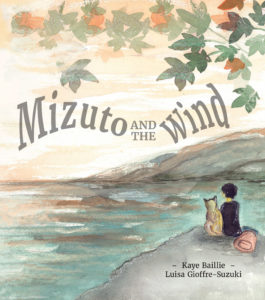Mizuto and the wind by Kay Baillie and Luisa Gioffre-Suzuki

When Mizuto says goodbye to his father who works at the coast, he reminds him of his promise to play soccer with him when he arrives home. But that day a powerful tsunami sweeps away everything along the coastline, including Mizuto’s father. Each day he expects to see him but he does not appear, his mother filling the home with silence.
Mizuto hears about a phone booth in a garden in Otsuchi where the wind carries messages to missing loved ones. Mizuto tells his mother but she is disinterested, so he decides to find the place by himself. He finds the phone booth and speaks to his father, the wind carrying his words through the air. Instead of the knot of crashing waves in his belly, he feels like a calm sea.
He tells his mother and the house becomes a place of comfort as the two talk as they had not done before. They tend his garden and speak his name every day, telling his stories at meal times.
One day she too goes to the phone booth and together they send their words to the missing man.
This beautifully told story of loss and hope is based on a story of a man who did build a phone booth in his garden, initially as a place of solace for his own loss, but later for anyone to come in and speak of their loss. The disconnected telephone allows people to speak of their feelings, to tell the wind of their loss, to join with others in sharing their grief.
The beautiful watercolour illustrations carry the image of the sea through the story, as it changes from a benign place to one of fury, destruction and loss, then back again to a place of serenity and beauty, of introspection and solace.
The illustrations parallel the words which talk of the sea in so many guises: the rumble of the tsunami, the long gone smile of his mother, once like a sunbeam on the sea, the boy feeling crushing waves in his belly, but now feeling lapped by a calm sea.
Themes: Death, Loss, Grief, Sea, Tsunami.
Fran Knight